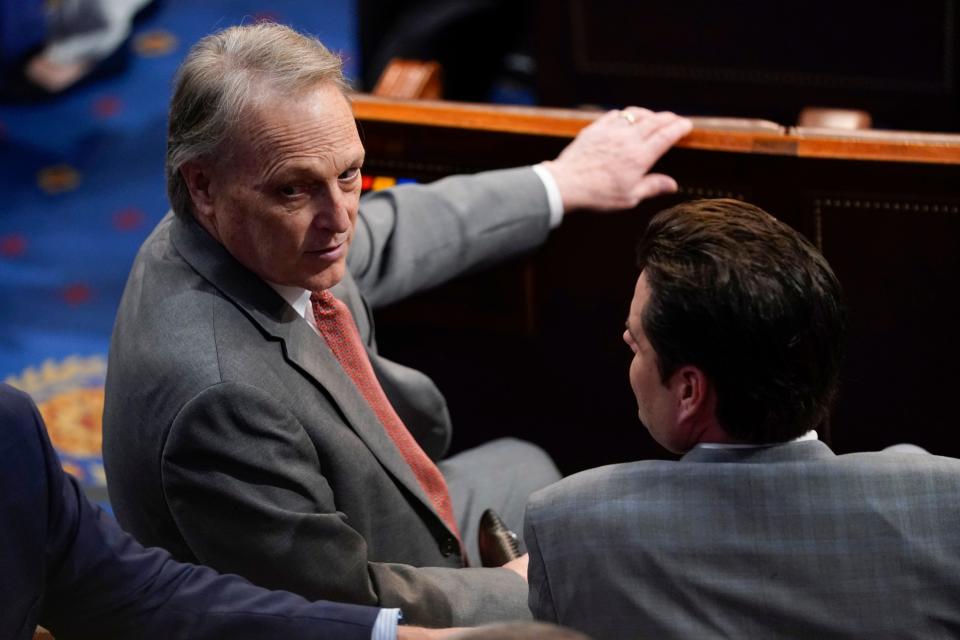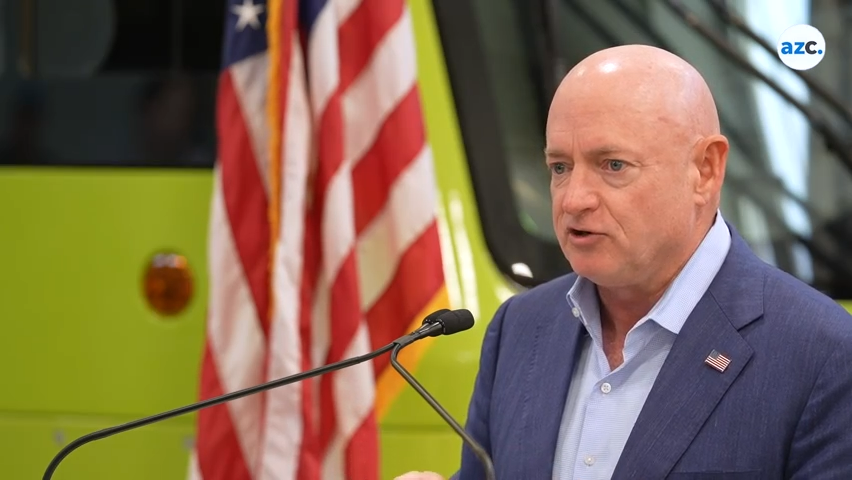Reps. Andy Biggs, Eli Crane among holdouts on budget in government shutdown stalemate
- Oops!Something went wrong.Please try again later.
- Oops!Something went wrong.Please try again later.
- Oops!Something went wrong.Please try again later.
Hard-line Arizona members of the conservative House Freedom Caucus are playing a big role in holding up a federal budget that could trigger a partial government shutdown this month.
A handful of the most conservative Republicans in the House have made clear they are willing to grind things to a halt to get what they want — spending cuts, no money for Ukraine, and border security.
If lawmakers don’t reach a deal by Sept. 30, they risk a government shutdown that would begin the next day. They can also buy time with a continuing resolution to extend current funding.
Rep. Andy Biggs, R-Ariz., played a major role in jamming things up Tuesday when he was among five Republicans who refused to even pass a military funding measure in protest of the larger budget being negotiated. His fellow Arizona Republican Reps. Eli Crane and Paul Gosar appear just as unwilling to join their party in passing a budget and sending the debate to the Senate.
Arizona has nearly 60,000 federal employees, according to the state Office of Economic Opportunity, though not all of them would be out of work in a shutdown because essential services like Border Patrol would stay on the job.
House Speaker Kevin McCarthy, R-Calif., has urged passing a broader budget measure to give the GOP at least some policy victories and to shift the spotlight to the Senate, which is controlled by Democrats and unlikely to approve a budget from the Republican-controlled House.
But even getting House Republicans to agree on a stopgap funding measure has been impossible because members of the Freedom Caucus want more impactful cuts to spending than what the broader Republican membership has proposed.
During the weekend of Sept. 16, Republicans in the House proposed a budget that would have cut government spending by 8% excluding defense and veterans affairs.
The short-term deal would keep the government running through October, giving time to reach a longer-term deal. But on Tuesday, Republicans postponed a procedural vote on the deal.
Biggs took to X, formerly known as Twitter, to explain his Tuesday vote against the defense-spending measure, and said he doesn’t trust McCarthy and House leadership.
“They are trying to make us look bad and put us in a corner because they haven’t done their job,” Biggs said.
“I don’t want to hold the military hostage,” Biggs continued. “That’s not what we are trying to do.”
Biggs' spokesperson Matthew Tragesser added Wednesday that he does not support a short-term funding resolution and wants federal spending returned to pre-COVID 2019 levels, and for the budget to address “weaponization of the federal government, the southern border, woke initiatives and waste.”
Crane is among the few Freedom Caucus holdouts in the House. Spokesperson Zach Kahler said he also will not support a continuing resolution to fund the government short term.
“He’s committed to not kicking the can down the road,” Kahler said Wednesday. “This country is in a financial crisis and the only way Washington will change is if it’s forced to change. The Congressman believes we need to go through the actual appropriations bills like House leadership promised, and write them to the levels that were agreed upon with Speaker McCarthy in January. They promised a lot of people a lot of things and it’s time to pay up.”
It’s time to force lasting change or grind this machine to a halt.
— Rep. Eli Crane (@RepEliCrane) September 19, 2023
Crane took to social media Tuesday to emphasize that the 8% spending cut was not enough and that he’s willing to take the blame for a shutdown if it results in larger government cutbacks.
“It’s time to force lasting change or grind this machine to a halt,” Crane said on X. “It’s time to cut up the credit cards and make some tough decisions,” he said in another post.
For the first time in history, U.S. national debt has eclipsed $33 TRILLION dollars.
Congress has failed. Both parties.
It’s time to cut up the credit cards and make some tough decisions.— Rep. Eli Crane (@RepEliCrane) September 19, 2023
He also shared comments from Rep. Anna Paulina Luna, R-Fla., that suggested Congress “defund” special counsel Jack Smith, who is leading the federal prosecution of former President Donald Trump, stop funding to Ukraine, lower spending and “add in policy riders.”
Biggs also downplayed the severity of a shutdown in a social media post, saying it would be “a pause in out-of-control federal spending related to nonessentials.”
“Our government will continue to operate during this period,” Biggs wrote.
Biggs also criticized spending on Ukraine.
“It was acknowledged by both Republicans and Democrats that Ukraine is one of the most corrupt countries in the world pre-Russian invasion. We’ll never have an account of all the money we’ve sent them. Why does the Biden Administration keep throwing away our taxpayer dollars?” Biggs said on X.

Meanwhile, Rep. Juan Ciscomani, R-Ariz., who like Crane is serving his first term but in a significantly more competitive district that has drawn a Democrat opponent for next year, has been urging Republicans to agree on a deal while also calling out federal spending.
“We must get Washington’s rampant spending under control,” Ciscomani said on X. “$33 trillion is unacceptable. House Republicans have passed appropriations bills that REDUCE spending. And this week Congress has an opportunity to deliver on them. It's time to do our job.”
After Biggs and four other Republicans held up the defense-spending measure, Ciscomani chastised his own party.
"What happened yesterday on the floor is unacceptable," Ciscoman said Wednesday on X. "We have a mandate to govern and that’s what I came to Washington to do. As appropriators, we have done our job, passing 10 of 12 bills out of the full committee. If Republicans can’t even agree to move the defense appropriations bill, then what will it take to find an agreement? Our service members deserve their pay raises and our military needs to be funded. Our border needs to be secured. The government needs to stay open to serve the public. These are my priorities and we need to work around the clock to get it done."
Republicans have a slight majority in the House, meaning that they can only lose a few votes from their own caucus and still move something past the Democratic minority. Losing any more of their own party’s votes ensures the failure of any measure without some Democratic votes.
That is what happened Tuesday when five Republicans opposed a measure to fund the Defense Department, leaving the measure to fail 214-212. Ciscomani, Crane, Gosar and Debbie Lesko from Arizona’s GOP voted yes on that. Biggs was one of five Republicans to join Democrats in voting no. Four other Republicans didn’t vote on the matter.
Rep. Greg Stanton, D-Ariz., said Wednesday in an interview with The Arizona Republic that the bipartisan agreement struck earlier this year when Congress had to extend the debt ceiling included spending cuts that McCarthy bragged about at the time, and House Republicans should honor that agreement now.
“Leadership and governing are the art of compromise,” he said. “It did have budget caps in that. I didn’t love that agreement. But you don’t substitute the perfect for the good when you are in a leadership position.”
He said the way to avoid an economically devastating shutdown is for McCarthy to get his members to stick with that deal.
“First rule of politics is, you reach an agreement, you have to stick with it,” he said.
He called it a “real test over whether or not we can govern.”
“If we end up in a long government shutdown because the speaker won’t move forward on the agreement he made, it is dishonorable and hurts the American people and the American economy.”
Sen. Mark Kelly, D-Ariz., told The Arizona Republic earlier in the summer he was concerned that partisanship would lead to a shutdown.

"Unfortunately there are members of the House and maybe even some in the Senate that don't have a problem with government shutdowns. I do," Kelly said. "People don't get paid, and when that happens it puts incredible stress on families. The government provides a lot of valuable services. It affects our national defense. We should not ever consider shutting the government down."
Government shutdowns created havoc in 2018, 2019
The most recent government shutdowns occurred in 2018 and 2019 under then-President Donald Trump and in 2013 under then-President Barack Obama.
The 35-day partial shutdown that ended in January 2019 was the longest in U.S. history, and arose over a dispute between Trump and Democrats over funding for a wall on the U.S.-Mexico border.
The shutdown ended when Trump relented on his insistence for $5.7 billion for spending on a border wall.
But that was only after it put thousands of Arizona’s federal workers under extreme financial hardship, with banks and credit unions offering special loans to help them make ends meet. Food banks also had to step up as workers went more than a month without a paycheck.
Trump relented after at least three major airports in the Northeast were seeing significant slowdowns because of security staffing shortages and as many government employees missed their second paycheck.
The Congressional Budget Office estimated the shutdown resulted in an $11 billion hit to the economy, although about $8 billion of it was expected to be recovered as people got paid and resumed their normal spending. The other $3 billion was estimated as a permanent loss to the economy.
The approximately three-day shutdown in January 2018 arose over a dispute about the Deferred Action for Childhood Arrivals immigration policy.
That shutdown put about 692,000 federal workers on furlough, including many of the 55,000 federal workers then working in Arizona, a number that has increased by about 5,000 today. Critical workers stayed on the job, but residents who needed help from the Internal Revenue Service, immigration courts or U.S. Forest Service were out of luck. Those pulled off the job included 860 people with the Arizona National Guard.
The IRS is not expected to be affected if the government shuts down this year.
The October 2013 shutdown lasted 16 days and had roots in a debate over funding for the Affordable Care Act. It caused about 850,000 government workers nationwide to go without paychecks, although they were paid retroactively when they returned to work.
Will the Grand Canyon stay open in a shutdown?
One positive that arose from the shutdowns in 2018 and 2019 was an executive order from then-Arizona Gov. Doug Ducey, who struck a deal with the National Park Service to spend hundreds of thousands of state dollars to keep the Grand Canyon open to visitors.
The park set a record in 2018 with more than 6.3 million visitors who spend almost $1 billion in the state, according to data from a visitation study.
His successor, Gov. Katie Hobbs, said Wednesday she will continue that policy to keep the park open if the government shuts down.
Reach reporter Ryan Randazzo at ryan.randazzo@arizonarepublic.com or 602-444-4331. Follow him on X, formerly Twitter: @UtilityReporter.
This article originally appeared on Arizona Republic: Reps. Andy Biggs, Eli Crane among holdouts in federal budget showdown

